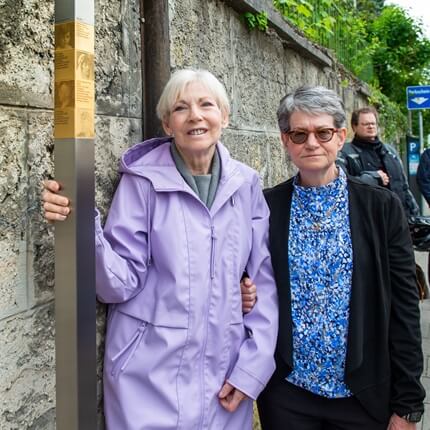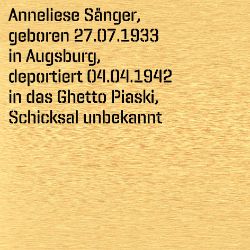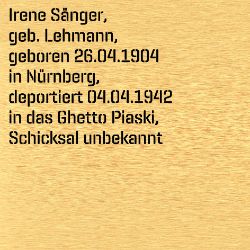My great-granduncle Siegfried Friedrich (Fritz) Sänger was born in Augsburg on September 12, 1891, the second child of Julius Sänger and his wife Rosa, née Einstein. This Jewish family had lived there since 1881. His siblings Berta, Else (Elsie), Alfred and Stephan Franz were also born in Augsburg. Photos that have been preserved show a happy family. When the First World War broke out, Fritz Sänger volunteered in 1914 for service in the German Army. He was later decorated with the Iron Cross. At the end of his active service, Fritz Sänger served in the German Army reserve and rose to the rank of lieutenant, which was a great exception for Jews at this period. When the war ended, Fritz Sänger completed his studies at the Technical University in Munich in 1919 with a diploma as a construction engineer. He became a part-owner of his family firm Kleofaas & Knapp, a construction and civil engineering firm in Augsburg. On August 23, 1932 he married Irene Lehmann, who came from Nuremberg. Their daughter Anneliese was born a year later. It is not clear what befell Fritz Sänger and his family in the first few years of Nazi rule. On November 11, 1938 he and his brother Alfred were sent to Dachau concentration camp in the course of the “Kristallnacht” pogroms. There, the SS put pressure on him until he sold the family firm and had a life insurance policy paid out in favour of “aryanizers”. Fritz Sänger surrendered the firm in Dachau concentration camp on November 30, 1938. Two weeks later, on December 15, 1938, he was released. He now no longer had any possibility of earning a livelihood for his family and himself, and he had hardly any possessions and no rights any more. In 1939 Fritz Sänger moved with his family from Augsburg to Maria-Einsiedel-Straße 4 in Munich. He became the director of the Jewish teaching workshops am Biederstein and taught wood and metal working in a workshop in the Jewish community centre. When the Gestapo (Secret Police) forced its clearance in 1939, the workshop was moved to the former synagogue at Reichenbachstraße 27. Up to 1941, some 100 Jewish young people from all over Germany received training there, which also included foreign languages to prepare them for emigration.
Family letters reveal that Fritz Sänger and his family were desperately trying to emigrate to America, but it was by now almost impossible to obtain a guarantee from a US citizen and other documents needed for a visa as well as money for their ship passages. Apart from this, there were strictly limited contingents of US visas available and the waiting lists were extremely long. Stephan Lehmann, the brother of Fritz Sänger’s wife Irene living in America, was heartbroken that he was not able to organise emigration to America for the family. (Text Nanac Freund-Heller, editor C. Fritsche, translation C. Hales)
On April 4, 1942 Fritz Sänger was deported with his wife, his eight-yeear-old daughter and his sister Berta to Piaski ghetto. The conditions there were barbaric. There was hardly any food or medicine and the living spaces were completely overcrowded. Many people did not survive the summer of 1942 because of the heavy forced labor in road construction. Arnold Hindel, who came from Brno, is the only known survivor of Piaski ghetto; he told later of skeletally emaciated people, many of whom were hardly able to stand on their own legs. As spokesperson for the Munich transport and a member of Jewish Council, Fritz Sänger fought for improvements in the conditions in the overcrowded ghetto. He managed to get the ghetto baths repaired and so to contain typhoid fever. In autumn 1942, Fritz Sänger was sent to the nearby Sawin forced labor camp, where he was put to work draining marshes, his wife and his daughter Anneliese were able to go with him. Every trace of him is lost after November 1942. It is to this day not known when, where and how he was murdered. Nor did Irene, Anneliese and Berta Sänger survive the Shoah, just like Fritz Sänger’s brothers Alfred and Stephan Franz and his sister-in-law Selma. The only member of the Sänger family to survive was Fritz Sänger’s sister Elsie, who emigrated to the USA.



-Sänger_portrait.jpg/jcr:content/PORTRAIT_14731.jpg)




